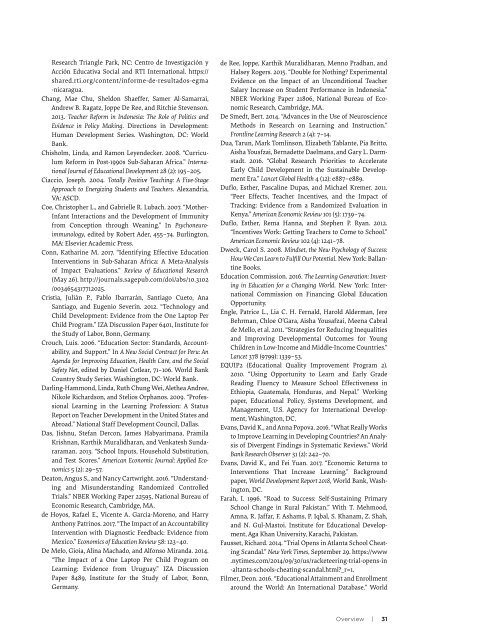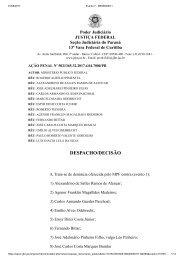Brasil só deve dominar Leitura em 260 anos, aponta estudo do Banco Mundial Relatorio Banco Mundial _Learning
Create successful ePaper yourself
Turn your PDF publications into a flip-book with our unique Google optimized e-Paper software.
Research Triangle Park, NC: Centro de Investigación y<br />
Acción Educativa Social and RTI International. https://<br />
shared.rti.org/content/informe-de-resulta<strong>do</strong>s-egma<br />
-nicaragua.<br />
Chang, Mae Chu, Shel<strong>do</strong>n Shaeffer, Samer Al-Samarrai,<br />
Andrew B. Ragatz, Joppe De Ree, and Ritchie Stevenson.<br />
2013. Teacher Reform in In<strong>do</strong>nesia: The Role of Politics and<br />
Evidence in Policy Making. Directions in Development:<br />
Human Development Series. Washington, DC: World<br />
Bank.<br />
Chisholm, Linda, and Ramon Leyendecker. 2008. “Curriculum<br />
Reform in Post-1990s Sub-Saharan Africa.” International<br />
Journal of Educational Development 28 (2): 195–205.<br />
Ciaccio, Joseph. 2004. Totally Positive Teaching: A Five-Stage<br />
Approach to Energizing Students and Teachers. Alexandria,<br />
VA: ASCD.<br />
Coe, Christopher L., and Gabrielle R. Lubach. 2007. “Mother-<br />
Infant Interactions and the Development of Immunity<br />
from Conception through Weaning.” In Psychoneuroimmunology,<br />
edited by Robert Ader, 455–74. Burlington,<br />
MA: Elsevier Acad<strong>em</strong>ic Press.<br />
Conn, Katharine M. 2017. “Identifying Effective Education<br />
Interventions in Sub-Saharan Africa: A Meta-Analysis<br />
of Impact Evaluations.” Review of Educational Research<br />
(May 26). http://journals.sagepub.com/<strong>do</strong>i/abs/10.3102<br />
/0034654317712025.<br />
Cristia, Julián P., Pablo Ibarrarán, Santiago Cueto, Ana<br />
Santiago, and Eugenio Severín. 2012. “Technology and<br />
Child Development: Evidence from the One Laptop Per<br />
Child Program.” IZA Discussion Paper 6401, Institute for<br />
the Study of Labor, Bonn, Germany.<br />
Crouch, Luis. 2006. “Education Sector: Standards, Accountability,<br />
and Support.” In A New Social Contract for Peru: An<br />
Agenda for Improving Education, Health Care, and the Social<br />
Safety Net, edited by Daniel Cotlear, 71–106. World Bank<br />
Country Study Series. Washington, DC: World Bank.<br />
Darling-Hammond, Linda, Ruth Chung Wei, Alethea Andree,<br />
Nikole Richardson, and Stelios Orph<strong>anos</strong>. 2009. “Professional<br />
<strong>Learning</strong> in the <strong>Learning</strong> Profession: A Status<br />
Report on Teacher Development in the United States and<br />
Abroad.” National Staff Development Council, Dallas.<br />
Das, Jishnu, Stefan Dercon, James Habyarimana, Pramila<br />
Krishnan, Karthik Muralidharan, and Venkatesh Sundararaman.<br />
2013. “School Inputs, Household Substitution,<br />
and Test Scores.” American Economic Journal: Applied Economics<br />
5 (2): 29–57.<br />
Deaton, Angus S., and Nancy Cartwright. 2016. “Understanding<br />
and Misunderstanding Ran<strong>do</strong>mized Controlled<br />
Trials.” NBER Working Paper 22595, National Bureau of<br />
Economic Research, Cambridge, MA.<br />
de Hoyos, Rafael E., Vicente A. Garcia-Moreno, and Harry<br />
Anthony Patrinos. 2017. “The Impact of an Accountability<br />
Intervention with Diagnostic Feedback: Evidence from<br />
Mexico.” Economics of Education Review 58: 123–40.<br />
De Melo, Gioia, Alina Macha<strong>do</strong>, and Alfonso Miranda. 2014.<br />
“The Impact of a One Laptop Per Child Program on<br />
<strong>Learning</strong>: Evidence from Uruguay.” IZA Discussion<br />
Paper 8489, Institute for the Study of Labor, Bonn,<br />
Germany.<br />
de Ree, Joppe, Karthik Muralidharan, Menno Pradhan, and<br />
Halsey Rogers. 2015. “Double for Nothing? Experimental<br />
Evidence on the Impact of an Unconditional Teacher<br />
Salary Increase on Student Performance in In<strong>do</strong>nesia.”<br />
NBER Working Paper 21806, National Bureau of Economic<br />
Research, Cambridge, MA.<br />
De Smedt, Bert. 2014. “Advances in the Use of Neuroscience<br />
Methods in Research on <strong>Learning</strong> and Instruction.”<br />
Frontline <strong>Learning</strong> Research 2 (4): 7–14.<br />
Dua, Tarun, Mark Tomlinson, Elizabeth Tablante, Pia Britto,<br />
Aisha Yousfzai, Bernadette Daelmans, and Gary L. Darmstadt.<br />
2016. “Global Research Priorities to Accelerate<br />
Early Child Development in the Sustainable Development<br />
Era.” Lancet Global Health 4 (12): e887–e889.<br />
Duflo, Esther, Pascaline Dupas, and Michael Kr<strong>em</strong>er. 2011.<br />
“Peer Effects, Teacher Incentives, and the Impact of<br />
Tracking: Evidence from a Ran<strong>do</strong>mized Evaluation in<br />
Kenya.” American Economic Review 101 (5): 1739–74.<br />
Duflo, Esther, R<strong>em</strong>a Hanna, and Stephen P. Ryan. 2012.<br />
“Incentives Work: Getting Teachers to Come to School.”<br />
American Economic Review 102 (4): 1241–78.<br />
Dweck, Carol S. 2008. Mindset, the New Psychology of Success:<br />
How We Can Learn to Fulfill Our Potential. New York: Ballantine<br />
Books.<br />
Education Commission. 2016. The <strong>Learning</strong> Generation: Investing<br />
in Education for a Changing World. New York: International<br />
Commission on Financing Global Education<br />
Opportunity.<br />
Engle, Patrice L., Lia C. H. Fernald, Harold Alderman, Jere<br />
Behrman, Chloe O’Gara, Aisha Yousafzai, Meena Cabral<br />
de Mello, et al. 2011. “Strategies for Reducing Inequalities<br />
and Improving Developmental Outcomes for Young<br />
Children in Low-Income and Middle-Income Countries.”<br />
Lancet 378 (9799): 1339–53.<br />
EQUIP2 (Educational Quality Improv<strong>em</strong>ent Program 2).<br />
2010. “Using Opportunity to Learn and Early Grade<br />
Reading Fluency to Measure School Effectiveness in<br />
Ethiopia, Guat<strong>em</strong>ala, Honduras, and Nepal.” Working<br />
paper, Educational Policy, Syst<strong>em</strong>s Development, and<br />
Manag<strong>em</strong>ent, U.S. Agency for International Development,<br />
Washington, DC.<br />
Evans, David K., and Anna Popova. 2016. “What Really Works<br />
to Improve <strong>Learning</strong> in Developing Countries? An Analysis<br />
of Divergent Findings in Syst<strong>em</strong>atic Reviews.” World<br />
Bank Research Observer 31 (2): 242–70.<br />
Evans, David K., and Fei Yuan. 2017. “Economic Returns to<br />
Interventions That Increase <strong>Learning</strong>.” Background<br />
paper, World Development Report 2018, World Bank, Washington,<br />
DC.<br />
Farah, I. 1996. “Road to Success: Self-Sustaining Primary<br />
School Change in Rural Pakistan.” With T. Mehmood,<br />
Amna, R. Jaffar, F. Ashams, P. Iqbal, S. Khanam, Z. Shah,<br />
and N. Gul-Mastoi. Institute for Educational Development,<br />
Aga Khan University, Karachi, Pakistan.<br />
Fausset, Richard. 2014. “Trial Opens in Atlanta School Cheating<br />
Scandal.” New York Times, Sept<strong>em</strong>ber 29. https://www<br />
.nytimes.com/2014/09/30/us/racketeering-trial-opens-in<br />
-altanta-schools-cheating-scandal.html?_r=1.<br />
Filmer, Deon. 2016. “Educational Attainment and Enrollment<br />
around the World: An International Database.” World<br />
Overview | 31








